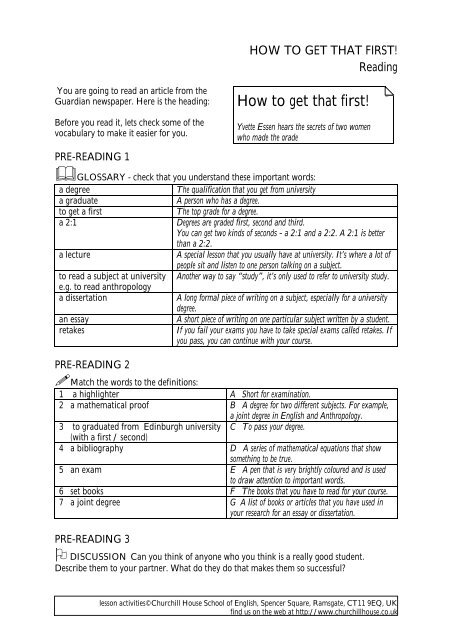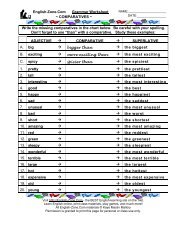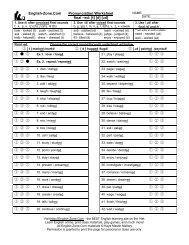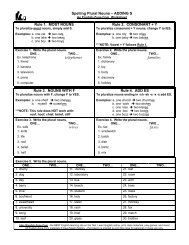How to get that first! - English-Zone.Com
How to get that first! - English-Zone.Com
How to get that first! - English-Zone.Com
Create successful ePaper yourself
Turn your PDF publications into a flip-book with our unique Google optimized e-Paper software.
You are going <strong>to</strong> read an article from the<br />
Guardian newspaper. Here is the heading:<br />
Before you read it, lets check some of the<br />
vocabulary <strong>to</strong> make it easier for you.<br />
PRE-READING 1<br />
HOW TO GET THAT FIRST!<br />
Reading<br />
�GLOSSARY - check <strong>that</strong> you understand these important words:<br />
a degree<br />
The qualification <strong>that</strong> you <strong>get</strong> from university<br />
a graduate<br />
A person who has a degree.<br />
<strong>to</strong> <strong>get</strong> a <strong>first</strong><br />
The <strong>to</strong>p grade for a degree.<br />
a 2:1<br />
Degrees are graded <strong>first</strong>, second and third.<br />
You can <strong>get</strong> two kinds of seconds - a 2:1 and a 2:2. A 2:1 is better<br />
than a 2:2.<br />
a lecture<br />
A special lesson <strong>that</strong> you usually have at university. It’s where a lot of<br />
people sit and listen <strong>to</strong> one person talking on a subject.<br />
<strong>to</strong> read a subject at university Another way <strong>to</strong> say “study”, it’s only used <strong>to</strong> refer <strong>to</strong> university study.<br />
e.g. <strong>to</strong> read anthropology<br />
a dissertation<br />
A long formal piece of writing on a subject, especially for a university<br />
degree.<br />
an essay<br />
A short piece of writing on one particular subject written by a student.<br />
retakes<br />
If you fail your exams you have <strong>to</strong> take special exams called retakes. If<br />
you pass, you can continue with your course.<br />
PRE-READING 2<br />
�Match the words <strong>to</strong> the definitions:<br />
1 a highlighter<br />
2 a mathematical proof<br />
3 <strong>to</strong> graduated from Edinburgh university<br />
(with a <strong>first</strong> / second)<br />
4 a bibliography<br />
5 an exam<br />
6 set books<br />
7 a joint degree<br />
<strong>How</strong> <strong>to</strong> <strong>get</strong> <strong>that</strong> <strong>first</strong>!<br />
Yvette Essen hears the secrets of two women<br />
who made the grade<br />
A Short for examination.<br />
B A degree for two different subjects. For example,<br />
a joint degree in <strong>English</strong> and Anthropology.<br />
C To pass your degree.<br />
D A series of mathematical equations <strong>that</strong> show<br />
something <strong>to</strong> be true.<br />
E A pen <strong>that</strong> is very brightly coloured and is used<br />
<strong>to</strong> draw attention <strong>to</strong> important words.<br />
F The books <strong>that</strong> you have <strong>to</strong> read for your course.<br />
G A list of books or articles <strong>that</strong> you have used in<br />
your research for an essay or dissertation.<br />
PRE-READING 3<br />
� DISCUSSION Can you think of anyone who you think is a really good student.<br />
Describe them <strong>to</strong> your partner. What do they do <strong>that</strong> makes them so successful?<br />
lesson activities©Churchill House School of <strong>English</strong>, Spencer Square, Ramsgate, CT11 9EQ, UK<br />
find us on the web at http://www.churchillhouse.co.uk
STUDENT A - READING TASK<br />
You are going <strong>to</strong> read about Melissa Malins. Your partner is going <strong>to</strong> read about Francesca<br />
Stellman. Read the article <strong>to</strong> complete the information about Melissa.<br />
Student<br />
University<br />
Degree<br />
Why is she so special?<br />
Melissa Malins Francesca Stellman<br />
What study techniques did<br />
she follow <strong>to</strong> be successful?<br />
Your notes<br />
<strong>How</strong> <strong>to</strong> <strong>get</strong> <strong>that</strong> <strong>first</strong>!<br />
Yvette Essen hears the secrets of two women who made the grade<br />
1 Melissa Malins graduated from King's College London with a <strong>first</strong>, she was awarded the<br />
Drew Prize for the Second Most Meri<strong>to</strong>rious Mathematics Graduate.<br />
“A<br />
lthough my degree had no coursework, I put a lot of work in during the year<br />
and went <strong>to</strong> virtually all the lectures, as you take things in subconsciously. I<br />
made notes in lectures and copied them up well in advance - often in different<br />
6 colours and sizes, using highlighters <strong>to</strong> make them look more interesting. As I had eight<br />
exams each year it was difficult concentrating on all my subjects without leaving one till<br />
the end or focusing <strong>to</strong>o hard on another. Some friends worked on five of the exams, but if<br />
you have retakes the following year your workload increases <strong>to</strong> an almost ridiculous and<br />
10 unmanageable level.<br />
I didn't like going <strong>to</strong> the library much as I can't work for hours on end in silence. Instead, I<br />
spent a lot of time with friends in the study areas as we unders<strong>to</strong>od different things so<br />
could help each other. It is reassuring when you realise you're not alone when you can't do<br />
something. Group study can be distracting as you often talk instead of working, so you<br />
15 need a happy medium and in the final stages I studied on my own.<br />
I tried <strong>to</strong> think of different ways <strong>to</strong> remember things: some proofs you just had <strong>to</strong><br />
understand, others I learnt parrot fashion, by mnemonics or rhymes. I found it better <strong>to</strong><br />
study in small half-hour sessions rather than five-hour trots as it stuck more in my head and<br />
I had <strong>to</strong> constantly test myself.<br />
20 Although a degree is really hard work and other things have <strong>to</strong> be sacrificed, <strong>get</strong>ting the<br />
result made it all worthwhile.”<br />
© Yvette Essen, the Guardian, Tuesday August 24, 1999.<br />
on the web at http://www.guardianunlimited.co.uk<br />
lesson activities©Churchill House School of <strong>English</strong>, Spencer Square, Ramsgate, CT11 9EQ, UK<br />
find us on the web at http://www.churchillhouse.co.uk
STUDENT B - READING TASK<br />
You are going <strong>to</strong> read about Francesca Stellman. Your partner is going <strong>to</strong> read about Melissa<br />
Malins. Read the article <strong>to</strong> complete the information about Francesca.<br />
Student<br />
Francesca Stellman Melissa Malins<br />
University<br />
Degree<br />
Why is she so special?<br />
What study techniques did<br />
she follow <strong>to</strong> be successful?<br />
Your notes<br />
<strong>How</strong> <strong>to</strong> <strong>get</strong> <strong>that</strong> <strong>first</strong>!<br />
Yvette Essen hears the secrets of two women who made the grade<br />
1 Francesca Stellman read anthropology and linguistics at University College London. She was<br />
the only person <strong>to</strong> <strong>get</strong> a <strong>first</strong> in her year.<br />
“T<br />
here is definitely more work doing a joint degree - this year alone I had two more<br />
courses than straight anthropology students. Easter was a nightmare as I had a<br />
dissertation and six essays, and two exams <strong>to</strong> revise for. <strong>How</strong>ever, I organised my<br />
6 time well by choosing essay titles, pho<strong>to</strong>copying readings and taking books out well in<br />
advance.<br />
To <strong>get</strong> a <strong>first</strong> you need <strong>to</strong> work consistently. I had lots of friends who worked hard this year<br />
but not in the <strong>first</strong> and second years. I also did all the reading for each essay, which helped<br />
10 as there was a large amount of coursework and my teachers commented on my "impressive"<br />
bibliographies and independent research.<br />
Living at home made a difference <strong>to</strong> my final grade. I had lots of parental support, my own<br />
space and could work in peace without worrying about things like food and ironing.<br />
<strong>How</strong>ever, self-motivation is also important, as if you miss an essay deadline, the lecturers<br />
15 won't chase you up. I planned ahead but it <strong>to</strong>ok me months <strong>to</strong> research, write and redraft my<br />
dissertation.<br />
For my finals I spent at least six hours a day revising and working on exam technique. As<br />
there isn't much time in exams I learnt a few <strong>to</strong>pics well, made lots of essay plans using past<br />
papers and listed the arguments on both sides. My social life was more restricted during the<br />
20 exam period, but I also tried <strong>to</strong> relax and not work late in the evening.”<br />
© Yvette Essen, the Guardian, Tuesday August 24, 1999.<br />
on the web at http://www.guardianunlimited.co.uk<br />
lesson activities©Churchill House School of <strong>English</strong>, Spencer Square, Ramsgate, CT11 9EQ, UK<br />
find us on the web at http://www.churchillhouse.co.uk
POST-READING<br />
�DISCUSSION. Ask your partner for the missing information for your chart. Was there<br />
anything <strong>that</strong> surprised him / her about the article?<br />
��VOCABULARY WORK 1 The article you read was full of word pairs. Look back at<br />
your article <strong>to</strong> complete the table. The <strong>first</strong> ones have been done for you.<br />
Melissa Malins<br />
Francesca Stellman<br />
a ridiculous<br />
an unmanageable<br />
well<br />
.................................<br />
in the final<br />
parrot<br />
..................................<br />
level<br />
....................................<br />
medium<br />
....................................<br />
...................................<br />
work<br />
a large<br />
.........................<br />
living<br />
...........................<br />
a social<br />
an essay<br />
amount<br />
in advance<br />
..........................<br />
support<br />
..........................<br />
..........................<br />
��VOCABULARY WORK 2 <strong>Com</strong>plete the sentences with the missing prepositions.<br />
Melissa Malins<br />
1 Melissa graduated ................ King's<br />
College London<br />
2 .............. a <strong>first</strong>.<br />
3 She said she put a lot of work ..........<br />
during the year.<br />
4 She always made notes .......... lectures<br />
5 and copied them .............. .<br />
6 She found it difficult <strong>to</strong> concentrate<br />
.......... all her subjects<br />
7 and not focus <strong>to</strong>o hard ................. just<br />
one subject.<br />
Francesca Stellman<br />
When you have finished dictate your sentences <strong>to</strong> your partner.<br />
1 Francesca was the only person <strong>to</strong> <strong>get</strong> a<br />
<strong>first</strong> ............... her year.<br />
2 She said <strong>that</strong> doing a joint degree<br />
meant <strong>that</strong> she had two exams <strong>to</strong> revise<br />
................ .<br />
3 Her teachers had commented .............<br />
how good her bibliographies and<br />
research was.<br />
4 She also thought <strong>that</strong> living ..............<br />
home helped her<br />
5 as she could work ............. peace.<br />
6 She said self-motivation was important<br />
as if you don’t do work, the lecturers<br />
won’t chase you ........... .<br />
7 She tried <strong>to</strong> list the arguments ............<br />
both sides of a subject.<br />
lesson activities©Churchill House School of <strong>English</strong>, Spencer Square, Ramsgate, CT11 9EQ, UK<br />
find us on the web at http://www.churchillhouse.co.uk
POST-READING<br />
�DISCUSSION. Ask your partner for the missing information for your chart. Was there<br />
anything <strong>that</strong> surprised him / her about the article?<br />
The newspaper article finished with advice for students. Look at the ideas below. Can you<br />
rank them in order of importance.<br />
<strong>How</strong> <strong>to</strong> <strong>get</strong> <strong>that</strong> <strong>first</strong>!<br />
The rules<br />
� Revise in advance. Plan a realistic timetable and stick <strong>to</strong> it.<br />
� Good class and lecture notes are vital for essays and revision.<br />
� Don't be afraid <strong>to</strong> ask lecturers questions or approach personal tu<strong>to</strong>rs for help.<br />
� Read set books on time.<br />
� Work on oral presentations, even if you aren't assessed on them. They may be taken<br />
in<strong>to</strong> account if you are borderline*.<br />
� Keep <strong>to</strong> deadlines. Once one essay is late it is easy <strong>to</strong> slip.<br />
� Leave time <strong>to</strong> research, write and rewrite dissertations.<br />
� Get in<strong>to</strong> the habit of good attendance and punctuality.<br />
� Last-minute cramming** may <strong>get</strong> you a 2:1, consistent work pays off in the long<br />
run.<br />
* borderline = a borderline pass in an exam is when you only just pass, a<br />
borderline fail is when you fail but only by a point or two.<br />
** cramming = trying <strong>to</strong> revise a lot just before an exam<br />
© Yvette Essen, the Guardian, Tuesday August 24, 1999.<br />
on the web at http://www.guardianunlimited.co.uk<br />
lesson activities©Churchill House School of <strong>English</strong>, Spencer Square, Ramsgate, CT11 9EQ, UK<br />
find us on the web at http://www.churchillhouse.co.uk
TEACHER’S NOTES<br />
LEVEL - Intermediate + SUITABLE FOR - young people who are studying at university.<br />
PRE-READING 1<br />
Go through with class<br />
PRE-READING 2<br />
1 E, 2 D, 3 C, 4 G, 5 A, 6 F, 7 B<br />
PRE-READING 3<br />
Do this as a pair-work. It will help the students <strong>to</strong> start thinking of the qualities of good<br />
students.<br />
READING<br />
The reading is done as a jigsaw reading. Students are in pairs A-B, A-B, A-B ... Student A<br />
reads one text, student B reads the other. They complete the table with their information.<br />
Afterwards, they ask each other <strong>to</strong> complete the missing information.<br />
Student<br />
Melissa Malins<br />
Francesca Stellman<br />
University King’s College London University College London<br />
Degree<br />
Why is she<br />
so special?<br />
What study<br />
techniques<br />
did she<br />
follow <strong>to</strong><br />
be<br />
successful?<br />
~ mathematics<br />
got a <strong>first</strong>, prize for second most<br />
meri<strong>to</strong>rious Maths. graduate<br />
put in a lot of work<br />
attended nearly all lectures<br />
made notes<br />
copied notes up in colour<br />
worked in study groups and on<br />
own<br />
used parrot fashion, mnemonics<br />
and rhymes<br />
anthropology and linguistics<br />
only person <strong>to</strong> <strong>get</strong> a <strong>first</strong> in her year<br />
organised her time well<br />
worked and prepared for essays in<br />
advance<br />
did all the reading for each essay<br />
planned ahead<br />
spent 6 hours a day revising<br />
learnt a few <strong>to</strong>pics well<br />
prepared using past exam papers<br />
tried <strong>to</strong> also relax and not work <strong>to</strong>o late<br />
POST-READING VOCABULARY WORK 1<br />
Students read their text <strong>to</strong> complete the missing words <strong>to</strong> make up the word pairs. The idea is<br />
<strong>to</strong> <strong>get</strong> the students <strong>to</strong> focus on common collocations.<br />
At this point, you might decide <strong>to</strong> let them read the other text as well.<br />
Melissa Malins<br />
Francesca Stellman<br />
well<br />
A HAPPY<br />
in the final<br />
parrot<br />
HARD<br />
IN ADVANCE<br />
medium<br />
STAGES<br />
FASHION<br />
work<br />
WELL<br />
living<br />
PARENTAL<br />
a social<br />
an essay<br />
in advance<br />
AT HOME<br />
support<br />
LIFE<br />
DEADLINE<br />
lesson activities©Churchill House School of <strong>English</strong>, Spencer Square, Ramsgate, CT11 9EQ, UK<br />
find us on the web at http://www.churchillhouse.co.uk
TEACHER’S NOTES CONTINUED.<br />
POST-READING VOCABULARY WORK 2<br />
Students complete the sentences with the missing prepositions. Afterwards, they could dictate<br />
their sentences <strong>to</strong> their partner.<br />
Melissa Malins<br />
Francesca Stellman<br />
1 Melissa graduated FROM Kings College<br />
London.<br />
2 WITH a <strong>first</strong><br />
3 She said she put a lot of work IN during<br />
the year<br />
4 She always made notes IN lectures<br />
5 and copied them UP<br />
6 She found it difficult <strong>to</strong> concentrate ON<br />
all her subjects<br />
7 and not focus <strong>to</strong>o hard ON just one<br />
subject.<br />
1 Francesca was the only person <strong>to</strong> <strong>get</strong> a<br />
<strong>first</strong> IN her year.<br />
2 She said <strong>that</strong> doing a joint degree meant<br />
<strong>that</strong> she had two exams <strong>to</strong> revise FOR<br />
3 Her teachers had commented ON how<br />
good her bibliographies and research was.<br />
4 She also thought <strong>that</strong> living AT home<br />
helped her<br />
5 as she could work IN peace<br />
6 She said self-motivation was important<br />
as if you don’t do work, the lecturers<br />
won’t chase you UP<br />
7 She tried <strong>to</strong> list the arguments ON<br />
both sides of a subject.<br />
POST-READING DISCUSSION<br />
If you have a large class, <strong>get</strong> pairs <strong>to</strong> do this <strong>first</strong>, then put two pairs <strong>to</strong><strong>get</strong>her <strong>to</strong> <strong>get</strong> them <strong>to</strong><br />
re-discuss it, and then discuss it with the whole group.<br />
Moni<strong>to</strong>r their discussion and afterwards give feedback on the good things they said, the errors<br />
they made and any pronunciation problems.<br />
OTHER IDEAS<br />
1. Students could read out their text <strong>to</strong> their partner pausing now and then. Their partner has<br />
<strong>to</strong> guess which word will come next.<br />
2 Students could choose 5 words or expressions <strong>that</strong> they would like <strong>to</strong> remember and make a<br />
note of them in their notebooks.<br />
3 You could choose a few short sentences from the text. Say them at a natural speed <strong>to</strong> the<br />
class and ask them how many words were in the sentence.<br />
4 Students write a similar article / similar list of “rules” called “<strong>How</strong> <strong>to</strong> fail your degree!”<br />
5 Student could discuss how they would like <strong>to</strong> improve their own study skills.<br />
lesson activities©Churchill House School of <strong>English</strong>, Spencer Square, Ramsgate, CT11 9EQ, UK<br />
find us on the web at http://www.churchillhouse.co.uk





![PRONUNCIATION WORKSHEET [s] sue [ß] shoe [z] zoo [Ω] vision ① ...](https://img.yumpu.com/10966980/1/190x245/pronunciation-worksheet-s-sue-ss-shoe-z-zoo-vision-1-.jpg?quality=85)
